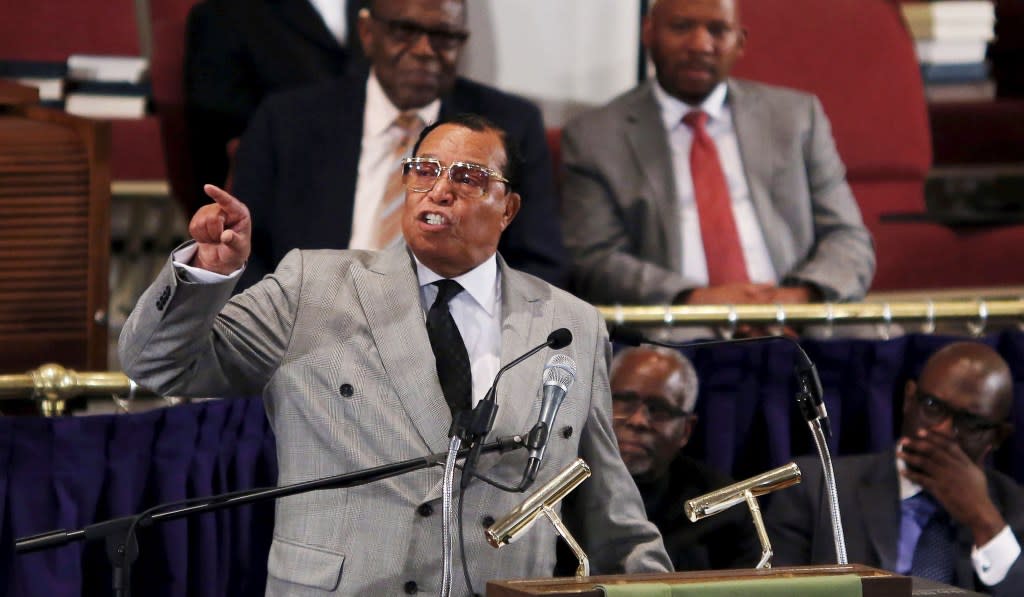Farrakhan’s Influence Remains a Problem

At a moment in American cultural history when even a hint of opposition to the Black Lives Matter movement can result in jobs being lost and people hounded out of the public square, the muted reaction to open expressions of anti-Semitism is striking.
When Philadelphia Eagles wide receiver DeSean Jackson posted fake Adolf Hitler quotes about Jewish perfidy and praised Nation of Islam leader Louis Farrakhan last week, he was criticized and eventually apologized. But the outrage was nothing compared with that encountered by Drew Brees, the star quarterback of the New Orleans Saints, when he spoke last month of his opposition to fellow National Football League players kneeling during the national anthem. While many NFL players condemned Brees for preaching respect for the flag, few of Jackson’s fellow players responded to his calumnies, and, among those who did, expressions of support outnumbered criticisms.
A week later, another Farrakhan-related flap has hit the news, and the public reaction has been strikingly similar. Over the weekend, it was revealed that television personality Nick Cannon, the host of Fox’s The Masked Singer, had spread anti-Semitic conspiracy theories and praised the Nation of Islam leader on his YouTube channel. Like Jackson, Cannon was caught repeating a popular NOI claim that African Americans are the “true Hebrews” and the real “Jewish people.” He also ranted about the power supposedly held by “the Illuminati, the Zionists, the Rothschilds.” Yet Fox was silent in the face of the news about his anti-Semitic diatribes, and there’s been no indication that it’s reconsidering its relationship with him.
The proper response to such controversies is not necessarily to demand that the offending party be “canceled,” of course. But it is notable that documented anti-Semitism doesn’t result in the sort of widespread news coverage and instant cancellation that racism toward African Americans does. And it is telling that Farrakhan still seems to be able to fly below the radar of mainstream media that are otherwise quick to blame “influencers” for the actions of their adherents.
It is unquestionable that Farrakhan has played a big part in legitimizing hateful attitudes toward Jews within the African-American community, as even the liberal writer and former ESPN personality Jemele Hill concedes:
In other posts around the same time, Jackson shared quotes from a speech made by the Nation of Islam leader Louis Farrakhan during the Fourth of July weekend. The speech mostly centered on police brutality, the coronavirus, Black empowerment, and self-reliance. But with Farrakhan’s long, vile record of anti-Semitism, Jackson — who is far from alone among Black Americans in his support for Farrakhan — can’t be surprised that people now question his true feelings toward Jews.
Yet Farrakhan continues to be treated as a respected figure in much of the black community. Indeed, few complained when he was given a place of honor at singer Aretha Franklin’s televised funeral in 2018. Former president Bill Clinton was not criticized in mainstream outlets for appearing with Farrakhan and publicly shaking his hand at the funeral.
Farrakhan’s views are as hateful as those of, say, Klan leader David Duke, and he has many more followers and a much wider sphere of influence than Duke. Yet Duke is rightly ostracized across the political spectrum, while Farrakhan remains welcome on the left.
Whether or not Jackson or Cannon are judged by a more generous standard than others who show prejudice is much less important than Farrakhan’s continued influence. So long as his anti-Semitism is dismissed rather than addressed head-on by African-American faith and political leaders as well as by their white friends and allies, we should not be surprised when statements such as Jackson’s or outbreaks of hateful violence against Jews occur. The willingness to downplay the anti-Semitism inspired by Farrakhan and his movement is a problem that must not be ignored.

